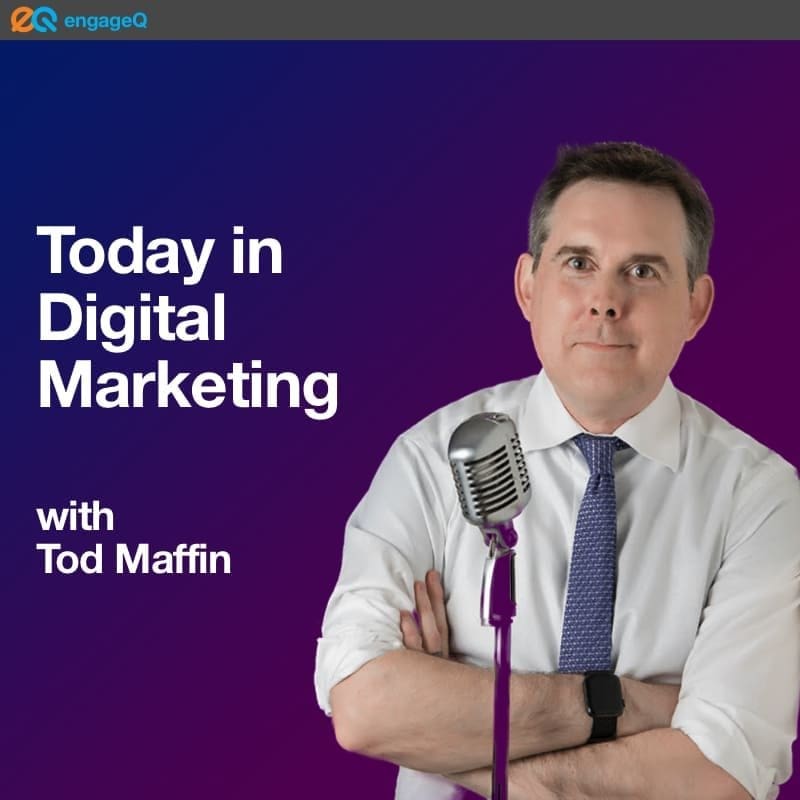Follow us: Mastodon, TikTok, Threads, Instagram • more
Follow Tod: Mastodon, LinkedIn, TikTok, Pixelfed • more
Listen to this newsletter as a podcast 🎧 Subscribe Free
If you like Today in Digital Marketing…
4 million people start their day with Morning Brew — the daily email that delivers the latest marketing and industry news.
Do you manage a busy Shopify store?
Subscribe to The Early Checkout. News, tools, and strategies that work now to grow your Shopify store's brand & sales.
In This Issue:
Everything you wanted to know about Google’s certified training programs [Premium Exclusive]
Drones get FAA approval to fly banner ads above Miami beaches
Instagram API now lets you promote Instagram Stories as ads
Instagram considers extending Reels to rival TikTok's 10-minute length
Gen Z teens choose to watch YouTube ads, and have high recall
Meta defies its Oversight Board's ruling for the first time
Google’s new AI-generated images watermark is not perfect
Everything You Wanted to Know About Google Ads Certification [Premium Exclusive]
Every Wednesday, exclusively in the Premium Newsletter, our Google ads correspondent Jyll Saskin Gales walks us through the latest platform changes. (Jyll runs the Inside Google Ads training program.)
🔐 This column is a Premium Exclusive. Upgrade today!
It’s A Bird, It’s a Plane, It’s an Ad Campaign!
One of my favourite TV shows — for years… decades, actually — has been the American summer reality show Big Brother. Think “Survivor,” but indoors and less dysentery.
And right in the very first season, there was a controversy. One of the contestants — a portly dad nicknamed Chicken George — was being mentally assaulted by viewers who had hired private planes to fly banners over the house, on the CBS lot.
The banners started by telling people to vote George out… that his family was on the outside mounting a nasty campaign against another contestant (that turned out to be true, actually).
The banners got so frequent, that the contestants started to wonder if the whole thing had been dreamed up by CBS to spook them… throw them off their game.
So, viewers hired a banner plane to address that conspiracy theory. [watch on YouTube]
Today, the show has a policy: Banner plane outside? Everyone goes inside.
I’ve often thought what that would be like now in the age of drones — if people could just drop off full notes, or packages, or audio recordings of other contestants’ diary room confessions.
Well, the future may not have much messaging in the air for reality shows, but there’s about to be a lot more for marketers.
The New Banner Drones
A company called Sustainable Skylines has received regulatory approval in the U.S. to fly their ads attached to tiny drones above Miami beaches.
This is the first time a drone ad-banner-towing operation has gotten FAA approval.
Until now, of course, it’s been planes flying them. And it’s been popular. Brands like Dunkin’ Donuts and J. Crew have flown ads behind real planes.
But drones:
Don’t need an airport
Don’t need a runway
Cost a lot less
Don’t need burning fuel
As for measuring effectiveness, the company was a little vague on that, but said it would use camera footage from the drones and third-party mobile data to measure campaigns.
In time, they hope to develop a kind of pricing algorithm based on local current events or the weather — more expensive on days when people are more likely to see the ads.
The company wouldn’t confirm specific pricing, but said it’s on par with traditional planes, and advertisers can buy the drone ads in two-hour blocks.
read more at marketingbrew.com
Instagram Upgrades Ads API and Tests 10-Minute Reels
A big change this week to the Instagram Ads API.
Until now, advertisers couldn’t promote images or videos used in Instagram Stories (in other words, use them as ads) via the Instagram Marketing API.
This has been fixed. This means that third-party tools, like Sprout Social or Hootsuite, will be able to turn those around (once they build it out on their end).
After consistently hearing about this pain point from our developer community, we have removed this unwanted friction for advertisers and now allow users to seamlessly promote their image and/or video media used in Instagram Stories as ads via the Instagram Marketing API.
Meta
Instagram Reels to Expand to 10 Minutes?
Also notable — it looks like Instagram is planning to expand the length of Reels. Currently, the max time you can record is three minutes.
A software engineer found code in the app suggesting they’ll expand that to ten minutes soon.
#Instagram is working on the ability to create #Reels up to 10 minutes long 👀
— Alessandro Paluzzi (@alex193a)
Aug 30, 2023
Expanding Reels from three minutes to 10 brings it closer to the length of many YouTube videos, though not that far away from short-term video rival TikTok, which already offers users more time to record videos.
TikTok introduced longer video content of up to 10 minutes for free users and a separate paid tier for up to 20 minutes so fans can watch more of their favorite creators.
YouTube, though, has been making a push to entice creators to embrace shorter content.
The Verge
Gen Z Teens Remember YouTube Ads
Some incredible numbers coming out this week from a new study about the online viewing habits of teens.
Research [PDF] from Precise TV and Giraffe Insights finds that six out of 10 teenagers would rather watch a YouTube ad than skip it. Sixty per cent!
Almost half say they can remember an ad they’ve seen recently.
The study was of Gen Z — that’s people born between 1997 and 2012 and also found that:
Almost 80% teens watch YouTube
Gen Z teens are twice as likely to recall an ad on YouTube than TikTok
One in five Gen Z teens said YouTube is part of their daily routine
These findings are already convincing many of our advertising partners — agencies, media companies and brands — to double down on YouTube as their top video advertising channel.
Denis Crushell, Chief Commercial Officer, Precise TV
YouTube reported a 4.4% increase in ad revenue for Q2 of this year.
Meta Rejects Its Own Oversight Board Ruling
Five years ago, when Meta created its own version of a Supreme Court — which they called the Oversight Board — they promised that it would be arms-length and they would abide by its recommendations. They would take the group’s decisions as binding.
Indeed, on the front page of their site, it reads:
Or… I guess… not?
This week, Meta refused to implement the Board’s recommendation to suspend the accounts of Cambodia’s former Prime Minister who’s accused of using Meta’s platforms to incite violence.
In one video he posted on Facebook, he told a crowd that his political opponents should either face him in court or “I rally [the Cambodian] People’s Party people for a demonstration and beat you up.”
The decision marks a stark divergence from the Oversight Board… a Meta-funded, independent check on the company’s most sensitive politically fraught content moderation decisions.
Recommendations aside, the Cambodia case proves that the buck for political content on Facebook and Instagram ultimately still stops with Meta and CEO Mark Zuckerberg.
Gizmodo.com
Yesterday, Meta released a statement saying the reason they would take the unusual step of rejecting the ruling was because doing what the Board said “would not be consistent” with its policies.
Google’s New Generative Image Watermarker
How much can consumers trust your product photos? Especially now in the age of generative AI? How can they tell that you haven’t just faked that shot?
Google says it has developed a technology that can invisibly watermark AI-generated images — a step toward one day letting people simply run a check, or have a browser extension flag created images.
The tool is called SynthID and it’s being tested right now.
For now, it only supports Google’s own text-to-image model, not any other of the more popular generative AI tools.
Most importantly, the company says SynthID can even survive image modifications — like monkeying with the colours, or adding filters, or even compressing the image.
The technology is paired with a recognition tool that can detect AI-generated images — but only images created by SynthID, and even then, it’s not perfect. It can basically tell you whether it thinks there’s a low or high likelihood that the watermark is present.
A French startup called Imatag offers a watermarking tool that it says can’t be removed by resizing, cropping, editing, or compressing an image.
OpenAI’s text-to-image tool, called DALL-E 2, places a tiny watermark on the bottom right-hand side of images that it generates.
But a common standard between providers seems to be a long way off.
If you’re enjoying Today in Digital Marketing, you’ll love Morning Brew!
There's a reason more than four million people start their day with Morning Brew — the daily email that delivers the latest marketing and industry news Make your mornings more enjoyable, for free.
Do you manage a Shopify store?
Subscribe to The Early Checkout. News, tools, and strategies that work now to grow your Shopify store's brand & sales.
Get Smarter on AI Marketing
The #1 AI marketing newsletter. Get smarter on AI Marketing with 2 emails every week on the latest tech news & AI marketing, and Linkedin growth guides. Read by execs at Amazon, Google & Linkedin. BONUS -> Get 5 Free Linkedin growth guides (worth $97) when you subscribe.
Some links in this newsletter may provide affiliate revenue to us.
This newsletter is powered by Beehiiv.














